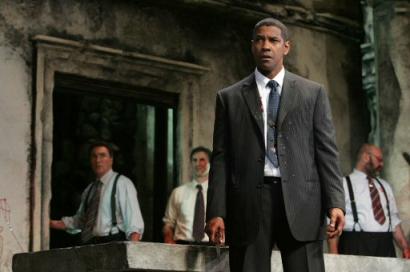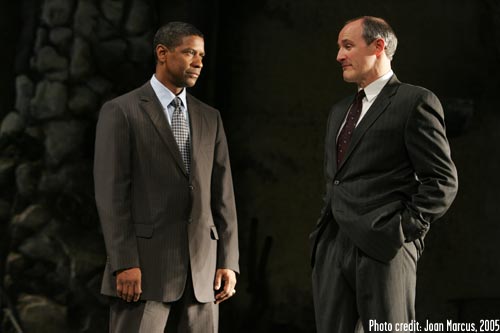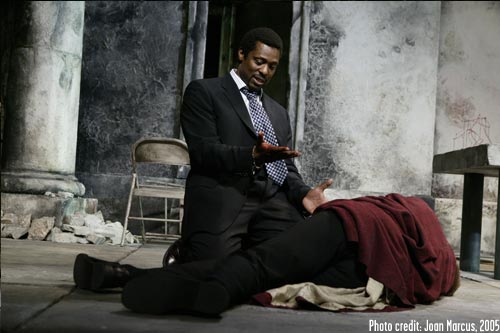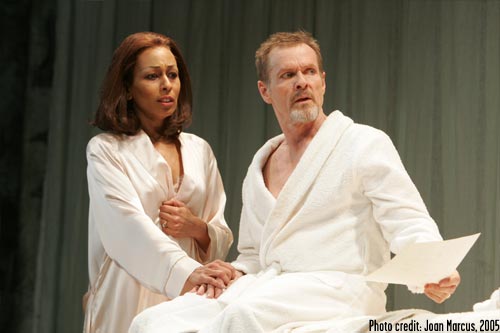Edgar Ray Killen, the 80-year-old Klansman mastermind behind the murders of James Chaney, Andrew Goodman and Michael Schwerner in 1964, is found guilty of three counts of manslaughter. To some extent, as with the recent Senate sorry-about-all-that-lynching resolution, I feel justice delayed is justice denied here. This fellow Killen got to live out the 41 years since — a lifetime he denied his victims — in freedom. Still, for the families of the slain, for the rule of law, and for the history books, it’s good to know that these crimes will no longer go unpunished. It may take a lifetime, but, as a purported man of the cloth such as Killen should’ve known, eventually the sins of the past will catch up with you. Update: Killen gets the max — 60 years.
Category: North America
Sylvia on Pointe.
 “Gillian Murphy, who danced Sylvia on Friday, looked as if she were born to dance this role. Her natural, bold attack and imposing presence make her the perfect Sylvia.” Gill’s star turn in ABT’s revival of Sylvia (which I caught at the Met on Friday) opens to stellar reviews. In addition, Gill is profiled in this month’s Pointe Magazine. (Unfortunately, the text is unavailable online, although the pics are here.)
“Gillian Murphy, who danced Sylvia on Friday, looked as if she were born to dance this role. Her natural, bold attack and imposing presence make her the perfect Sylvia.” Gill’s star turn in ABT’s revival of Sylvia (which I caught at the Met on Friday) opens to stellar reviews. In addition, Gill is profiled in this month’s Pointe Magazine. (Unfortunately, the text is unavailable online, although the pics are here.)
Washington in Rome.
“Why should his name be sounded more than yours? Write them, yours is as fair; Sound them, Yours doth become the tongue as well.” Why? Well, cause he’s a full-fledged movie star, that’s why. Still, despite having a bit of a muttering problem at times, Denzel acquits himself “honorably” as Brutus in Julius Caesar, which I saw last night at the Belasco Theatre. Set in a half-post-apocalyptic, half-Depression-era Rome that evokes anything from Masked & Anonymous to Black Hawk Down, this version of Shakespeare’s classic is innovatively staged and well-worth seeing, but, unfortunately, it also suffers from a stylistic dissonance that hinders the play at its most crucial moments.
The central problem with this production is the clash of acting methods. Many of the actors — and particularly Denzel — underplay their roles to the extreme. In fact, in delivery if not in diction, Denzel’s naturalistic Brutus is only a step or two from most of his other performances, be it Glory, Devil in a Blue Dress, or The Manchurian Candidate. That would be fine, if everyone else was on the same page, and a lot of the other actors are. Jack Willis (at left) deadpans Casca like Cypher from The Matrix, and Patrick Page steals his one major scene (in which he convinces Caesar to report to the Senate on the Ides of March) by portraying Decius Brutus as the worst kind of unctuous DC aide, complete with a leather executive folder in tow and a flatterer’s simper plastered on his face.
Unfortunately, some of the other actors didn’t get the memo. Bill Sadler’s Caesar is prone to acts of grandstanding, but that’s acceptable — he’s Caesar, after all, and bestrides the narrow world like a Colossus. No, the main offender is Colm Feore as Cassius, who plays the lean, hungry Machiavel in full “Master Thespian” mode — at times he’s hammier here than he was in Riddick. I’ll admit, I may be being a bit hard on Feore, as Cassius has always been one of my favorite Shakespearean characters (well, until he gets all weepy and high-maintenance in the second half of the play.) And Feore’s performance might be fine for a different cast of Caesar…but here, he’s just off. If this is Denzel’s Julius Caesar, as everything seems to suggest, Feore’s portrayal of Cassius should have mirrored Denzel’s low-key, understated Brutus. Instead, Feore is overplaying to the hilt, and the contrast is jarring in every scene the two central plotters share.
The Denzel-disconnect causes problems elsewhere, too, notably in the crucial Act III funeral speeches. Eamonn Walker makes a fine Mark Antony throughout, but he just doesn’t have the star wattage or natural charisma of Denzel Washington. As a result, Antony’s manipulative eulogy — the critical hinge moment of the play — seems slightly tepid and uninvolving compared to Brutus’ earlier rousing oratory. It’s possible that I’m just ruined by the James Mason-Marlon Brando version, as there does seem to be some precedent in the play for this take: “I am no orator, as Brutus is…I have neither wit, nor words, nor worth, action, nor utterance, nor the power of speech, to stir men’s blood.” Still, I think there’s a dramatic problem if Brutus’ oration is more of a showstopper than Antony’s. If anything, it seems here that their roles should have been reversed.
Still, despite these grievances, Julius Caesar is a satisfying production for the most part, with some particularly nice visual flourishes throughout. The Escape from New York, Berlin-bunker look of the set seems strange at first, but gains potency as the play darkens — in the “Cinna the poet” mob scene, for example. (Speaking of which, between this and Sith, it’s been a bad week for republics.) And I particularly liked the look of the Senate, even if it was somewhat reminiscent of Liev Schrieber’s EXCOMM war room in the Henry V revival two years ago. (With that in mind, the play gets off a great Homeland Security gag, as the various conspirators have to figure out a way around the Senate metal detector.)
The war scenes of the final acts are also surprisingly kinetic, with Roman forces garbed in guerilla green or black weaving through the hollowed-out set and spouting commands in verse. In fact, while I guess this shouldn’t be a shock given the subject matter, this production of Julius Caesar is also quite grisly — they don’t skimp on the blood and gore, and Sadler’s corpse is frozen in a horrifying Ring-like rictus scream during the Antony speech. (Strangely, this produced nary a shudder in the crowd, while the mere sight of Caesar’s bare posterior earlier on sent the audience into a paroxysm of shocked gasps — the MPAA has screwed up this country something fierce.)
So, in sum, Julius Caesar is a worthy production that makes for a good evening out, but it’s got some issues that keep it from being an all-time classic version of the play. The fault, dear readers, is not in its stars, but in its supporting cast, that they are underlings. In the end, a more balanced production, with either more or less star power, would have probably worked out better.
Eternal Crossing of the Spotless Fink.
In between film projects, the Coen Brothers and Charlie Kaufman have teamed up for Carter Burwell’s Theater of the New Ear, a pair of radio plays recently performed at London’s Royal Festival Hall. The cast includes Steve Buscemi, John Goodman, Marcia Gay Harden, and Philip Seymour Hoffman for the Coen’s “Sawbones,” and Meryl Streep, Hope Davis, and Peter Dinklage (taking time off from Lassie, I presume) in Kaufman’s “Hope Leaves the Theater.” (These apparently were also performed in Brooklyn two weeks ago, but tickets were hard to come by.)
In the Key of X.
“‘I think people will find something in the objects to provoke new levels of interest and new levels of scholarship,’ Howard Dodson, chief of the Schomburg, said in an interview. ‘We’ve consciously tried to stay away from putting a heavy interpretative line on it and to let Malcolm X speak for himself.’” The NYT previews the new Malcolm X exhibit, opening at the Schomburg Center next Thursday.
Kirk has some explaining to do.
Be careful at those conventions, folks…According to a grisly recent LA Times story on the Toronto Sex Crimes Unit’s attempts to curb kiddie porn, “All but one of the [over 100] offenders they have arrested in the last four years was a hard-core Trekkie.” (Others have rightfully cast doubt on this rather dubious claim.)
Prize Jury.
 Neglected to mention this earlier…but last week, I caught Roundabout’s Twelve Angry Men revival at the American Airlines theatre. As with Streetcar, my basis for comparison is fuzzy — I saw the Henry Fonda film years and years ago. Nevertheless, I’d say this version does justice to the material, and is well worth seeing if you get the chance.
Neglected to mention this earlier…but last week, I caught Roundabout’s Twelve Angry Men revival at the American Airlines theatre. As with Streetcar, my basis for comparison is fuzzy — I saw the Henry Fonda film years and years ago. Nevertheless, I’d say this version does justice to the material, and is well worth seeing if you get the chance.
Unlike the star-studded HBO version, this 12 Angry Men works as a great showcase for underappreciated character actors. The most famous face is probably the ubiquitous James Rebhorn as Juror #4, although #7’s John Pankow (a.k.a. Paul Reiser’s brother on Mad About You) and Broadway veteran Tom Aldredge (Clooney’s boss in Intolerable Cruelty) as #9 may also elicit a stir of recognition. To a man, this cast performs admirably, with each actor getting his moment in the sun.
Alas, if the show has a weak link, it may well be Boyd Gaines as Juror #8 (the Fonda role.) In a way, it’s not Gaines’ fault – but the fact that he looks like a cross between Fonda and Jimmy Stewart invites comparisons that redound against him, particularly as it seems at times that he’s actually doing a Fonda impression. [Robert Foxworth (formerly of Falcon Crest), does better in the less-iconic Lee J. Cobb role (#3) — if anything, he reminded me of Darren McGavin.] Still, this is a quibble. In general, 12 Angry Men is an engaging night out (and good mental prep for my own jury duty in a few weeks.)
By the way, I’m on the Roundabout Theatre mailing list, but if any readers out there know the mailer discount codes for The Glass Menagerie, Hurlyburly, Glengarry Glen Ross, and/or particularly Denzel’s Julius Caesar, the information would be much appreciated. 🙂
Delusions of Grandeur.
“Even among many influential conservatives, there has been a growing consensus that the Bush governing theory, at least on Social Security, has been proved wrong.” 100 days into the second term, the Dubya White House starts to realize they may not have received a mandate after all. Meanwhile, on the Left Coast, the Governator is learning much the same lesson.
Ladies and Gentlemen…
Bob at the Beacon, Night 3 (for me) [Monday/Tuesday]:
Maggie’s Farm / To Ramona / Cry A While / Bye And Bye / Ballad Of Hollis Brown / If You See Her, Say Hello / Lenny Bruce / Honest With Me / The Lonesome Death Of Hattie Carroll / High Water (For Charley Patton) / I Shall Be Released / Highway 61 Revisited
Encore: Po’ Boy / All Along The Watchtower
In all honesty, I think this was my least favorite setlist of the three shows (that missed Wednesday gig still haunts me.) Although I did get to hear my favorite song on Love & Theft this time around — “Cry A While” — I generally prefer the Time Out of Mind cuts when it comes to the new stuff. Still, the show wasn’t a bad one by any means, and while my own personal highlights came early in “Maggie’s Farm” and “If you See Her, Say Hello,” it was also nice to hear “Hollis,” “Hattie,” and “I Shall Be Released.” (And even after two previous shows, nine of tonight’s 14 songs were new to me during this Beacon stand.)
So, that wraps up this leg of the Never-Ending Tour…Next up for Dylan: A ball park summer swing with Willie Nelson, which unfortunately won’t be making it to the city. Catch it if you can. (And by the way, if you ever hit up the Beacon for a summer show, dress light. It’s a great venue in terms of acoustics and view, but the air flow in there leaves something to be desired.)
Subterranean Homesick Blues.
Aw, man. Drifter’s Escape, Senor (Tales Of Yankee Power), Girl Of The North Country, Tangled Up In Blue, A Hard Rain’s A-Gonna Fall, and Blind Willie McTell? That’s a killer setlist, and no mistake. Monday and Tuesday were both grand, but I hope at least some of these cuts — particularly Senor and Willie — show up on Dylan’s Saturday night closer. Update: Shelter from the Storm, Love Sick, Not Dark Yet, and Things Have Changed? Bob, you’re killing me.






